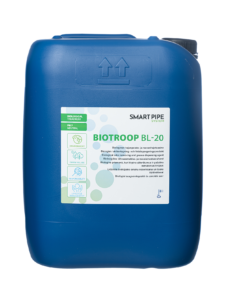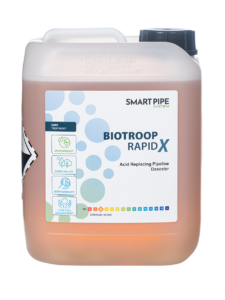We often receive questions about the ability of our solutions to solve a variety of plumbing problems. Is our microbial solution only for digesting fat-based waste, or can it also work in other areas? This article will help clear up any confusion and guide you in choosing the right solution for different applications.
From anticipation to problem solving
In our most used product, BioTroop BL-20, the bacteria in solution are selected to break down triglycerides and fatty acids. But they are not limited to food-based fats and oils. BL-20 bacteria also degrade other organic wastes in conventional pipelines, suction lines, drains and grease traps. This includes food waste such as protein (meat) and carbohydrates (rice, starches, etc.).
In the degradation process created by our solution, bacteria form a biofilm on the inner surface of the tube, making it difficult for fats to adhere and preventing blockages. It is therefore important to start the biological treatment process even when the pipes are new or clean.

If the solution is used in sewage systems, the proportion of food-based fats and oils relative to total COD is significantly lower, but still some. The situation becomes even more favourable for the microbial solution if grey and black water are mixed. Bacteria process black water fats or oils in the same way as food-based fats in the kitchen’s grey water pipes.
The most common inorganic deposits in pipes are calcium and magnesium salts (water-soluble carbonates), which combine with uric acid. Salts accumulate in sewage pipes for a number of reasons, including alkaline cleaning agents, heat, poorly constructed piping and complex structures. A dense and difficult to remove mass is called urinary calculus, which can be difficult for bacteria and chemicals to penetrate.
For each of our customers’ plumbing problems, there are two models to choose from:
Preventive model
A biological product that forms a biofilm in a tube:
- Reduces or prevents the formation and adhesion of deposits.
- Maintains an acidic pH in the biofilm, preventing mineral deposition.
- The bacteria also produce biodegradable surfactants that help break down fatty acids.
- Bacteria can also produce polyamino acids, which bind to small crystals to prevent them from growing and sticking.
- Enzymes produced by bacteria are critical to where uric acid crystals are formed.
- If urinary calculus starts to form, the bacteria in the solution see it as a food source and can break down the calculus completely.
Problem-solving model (BioTroop RapidX)
If enough urinary calculus has built up to block the pipe, the deposits need to be removed. This is usually done with corrosive mineral acids or by replacing the entire pipe. Mineral acids are effective in removing deposits, but are hostile to steel pipes. They dissolve the carbonate-based deposit in the pipe, leaving behind a honeycomb-like structure that must be removed mechanically. The use of mineral acids can shorten the life of the pipe and destroy the beneficial biofilm that has formed on the inner surface of the pipe. Our solution is kinder to both the environment and the pipe.

BioTroop RapidX is a calcium removal product we have developed for use in blackwater systems. RapidX offers the benefits of mineral acid without the risks associated with organic acid. The product is activated only when it encounters urinary calculus and deactivated when all deposits have dissolved, so it is not harmful to biological wastewater treatment systems. The solution to the problem is ecological. BioTroop RapidX can also be used as a preventive agent by dosing it into blackwater systems. This helps to maintain a sufficiently low pH in the suction tube and completely prevents the mechanism of urinary stone formation.
Summary:
The most important outcome is customer satisfaction. The situation is always different in old premises than in new ones, where the preventive model can be applied from the start. In the near future, machine learning pipeline systems will be able to make decisions themselves based on the above problems and decide the best way to clean the pipeline. However, before we can get to the machine learning system, we have to solve the problems manually. As long as there are people, organic waste problems will require solutions.


